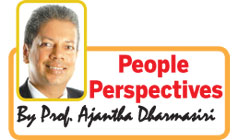Sins against synergy
 Teams are in high demand. In the world of sporting and business
alike, this is the case. What is so special in a team? What derails a
team's success? Today's column sheds light on dealing with the magical
factor in a team's synergy. Teams are in high demand. In the world of sporting and business
alike, this is the case. What is so special in a team? What derails a
team's success? Today's column sheds light on dealing with the magical
factor in a team's synergy.
Overview
Teams and groups are often interchangeably used to describe a set of
people working together. In perusing through the literature of
Organisational Behaviour, veterans such as Stephen Robbins and Fred
Luthans have identified a group as a set of two or more people
interacting with and interdependent on each other in achieving a common
objective. A team is one step ahead.
I would simplify a team as a group with synergy. The term synergy can
be regarded as an abbreviation of synchronised energy. It is all about
working together.
A team can easily decay when synergy is absent. How can it happen?
What could be such possible contributors? I call them 'sins'. They are
the acts of violating the proper way of doing things. Let's discuss
seven such sins against synergy. They are associated with seven Cs,
confusion, confrontation, contamination, convolution,
compartmentalisation, collusion and corruption.
Sin of Confusion
This is all about not knowing the means to the end. Clarity of goals
is one key aspect, to avoid confusion. There should not be any 'social
loafers' as Stephen Robins call the category of people who are mere
'passengers'. Every team member should do his best to make their team
the best.
|

WWW.WRIMSOFTW.BLOGSPOT.COM |
Sri Lanka's cricket team which won the World Cup in 1996 is one such
example. They had a clear goal. They went ahead without any confusion.
In the game of business, employees should be clear about why they do
what they have to do, and how best they should do it. A creative writer
in an advertising team who has a sense of pride in his or her work with
freedom to take decisions is an example.
Sin of Confrontation
Conflicts are common feature when people work together. Yet, how they
successfully overcome such conflicts indicates the path to progress.
When confrontation becomes the norm, the process of working together
will not run smoothly to achieve results.
I have seen how egos of different team players clash in search of
supremacy and dominance. Some find it difficult to give up for others to
take over. The end result is inevitably a losing team. This may be true
for corporate managers and public administrators alike.
Sin of Contamination
Teams have to have what I call a T-T match. This is about tasks and
talents. The right person handling the right task in the right possible
manner. We can anticipate the results if Mahela becomes the opening
bowler and Malinga becomes the opening batsman in our cricket team.
That's where contamination can occur. Whether the team members are
having a set of specified tasks with autonomy to carry them out is
important. For that to happen, tasks have to be well designed with the
goals in mind. The team members should identify themselves with the
tasks and see the significance of such tasks. In a cricket team, a
wicket-keeper should know exactly what his role is to win a game.
Sin of Convolution
This occurs when a healthy mix of diverse role players are not
included in the team. As we know, the five fingers of a hand are
different, yet they are all part of the same hand.
Diversity is a key factor of team effectiveness. Meredith Belbin did
a fair amount of research on team roles and came up with nine different
team roles. Ensuring that people with appropriate personalities fit to
the tasks is essential in this respect. Flexibility of team members in
moving beyond the specialised tasks for the betterment of team is
another important aspect. A specialised bowler of a cricket team should
be a good fielder and also a satisfactory batsman. This is flexibility.
In a business setting, the ability to attend to a colleague's duty in
case of need, is handy and a true sense of multi-skilling.
Sin of Compartmentalisation
There has to be a climate of trust for team work to foster. As the
olden saying goes, 'Birds of a feather flock together'. Scientists say
migrant birds fly as a 'V' shape formation to exert lesser energy, by
way of thriving on higher aero-dynamic power. It is simply, trusting one
another. When it is missing, people get into their narrow compartments.
Leadership plays a vital role to prevent compartmentalisation. The
team leader should rally the team around a common vision, and a common
set of goals. Vision has to be shared with the team and supported by the
team. In cricket, we have seen the rise and fall of teams under
different leaders. The same is true for business.
Sin of Collusion
This is a subtle aspect where team members overtly show support and
respect for each other but not in a real sense.
They might have a 'back-stabbing culture' as someone described their
corporate setting. You artificially smile while keeping the dagger
behind waiting for an opportunity to stab. The key team aspect
associated here is team efficacy. It is the belief of the team of its
ability to achieve the desired results. In the sporting world, the
losing teams lack team efficacy.
The team that has a high degree of self-efficacy can turn a game from
the grip of losing it. We saw that happening in many one-day cricket
series involving Sri Lanka. There are many instances where sales teams
of local organisations with high team efficacy have beaten their
multinational counterparts.
Sin of Corruption - This can be the most acute enemy in damaging
synergy. The key factor is the use and abuse of resources. Much has been
stated about it in the political scene in the East and the West alike.
Values are more in the breach than in practice, which is becoming the
norm. Volumes have been written on this yet the practices continue to
thrive.
True enough, a team cannot have all the resources in the world, or
for that matter, all what is nice to have. The optimisation of resources
is what should be aimed at. You cannot build great wall without solid
bricks and mortar. Waste cutting instead of mere cost cutting is what is
pragmatic.
Success sans Sins- As we saw, the seven Sins can result in dire
consequences. What we need instead is to sustain synergy in having team
effectiveness. It will be a worthwhile exercise to assess your team with
regard to its effectiveness. You may identify the bottlenecks in one or
more of these elements. Making key decisions and taking appropriate
actions is the only way forward in strengthening team effectiveness. The
writer is the chairman of PIM |

